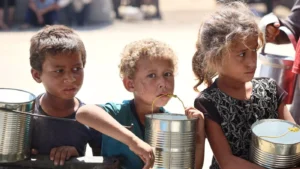In Gaza dying of starvation is much worse than dying from bombs

Children wait for food being distributed at a camp in Khan Yunis, southern Gaza, on 11 June 2024
Ahmed Dremly writes in Middle East Eye on 2 July 2024:
Yesterday, I dreamed of eating bananas and apples. I woke up with a wide smile on my face – but that fleeting joy quickly turned to disappointment as I realised I was still here, in northern Gaza, with an empty stomach, amid a genocide.
This isn’t the first time we have faced famine in the enclave. Since 7 October, Israel’s military has prevented or strictly limited the entrance of essential, life-saving food into Gaza. They have bombed food stores and bakeries, aiming to starve us to death if they can’t kill us with their weapons.
We were forced to find alternatives to white flour, which became unavailable or exorbitantly priced. We used animal fodder, and when that ran out, we started eating leaves and grass to fill our empty stomachs.
Most of my family and other people I know in Gaza, especially children, are suffering from diseases such as jaundice and hepatitis due to malnutrition and dehydration.
At one point, Israel allowed a slight influx of humanitarian aid, which felt like a small reprieve for our weakened bodies – but it was short-lived, followed by even stronger measures to prevent food from entering Gaza.
Like many Palestinian families, in October, we stockpiled whatever vegetables, spices and canned food we could find – items that wouldn’t spoil without refrigeration, since we’ve had no power since the war began. But our supplies ran out within a few weeks. People then began searching for food in houses that were no longer occupied, or even in the rubble – but those supplies were quickly gone, too.
Some markets still have items of food for purchase, but people are broke after almost nine months of war. I spent all my savings and took on debt, as did my brother and sister. Many people have sold furniture or other belongings to buy food, flour or medicine.
Do we laugh or cry?
As of late June, it has been more than four months since my family has had a supply of fresh vegetables, meat, or any other healthy foods. We survive on flour, limited canned goods, and legumes – the only foods allowed into Gaza via the humanitarian aid trucks waiting at the borders. We eat the same types of food every day.
My young nieces and nephews often cry and refuse to eat the same monotonous meals, despite my sister’s efforts to spice up the recipes. My four-year-old niece, Tia, cried because she wanted watermelon after seeing it in a cartoon. We lied to her, saying it’s not healthy, just to stop her tears. We’ve since learned to avoid showing the children any photos or videos of food.
